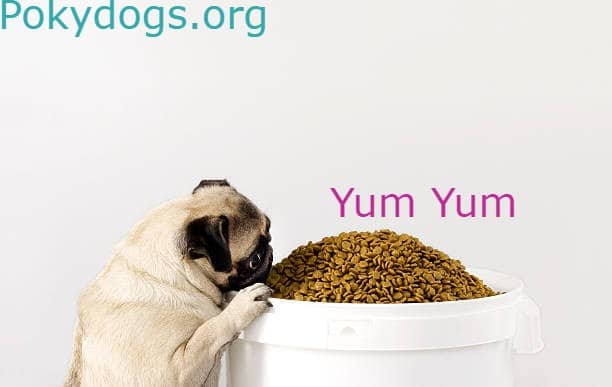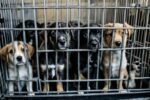Optimal English Bulldog Food: A Comprehensive Guide

New bulldog parents always enquire to find out the best English bulldog food that will require them to spend less on visits to vets. If you were forced to adopt or buy the dog, you would naturally not want to keep your dog in harm’s way.
A great diet for bulldogs should consist of high levels of natural proteins. Bulldogs are susceptible to weight gain and have “soft stomachs,” which means they have routes for food allergies.
This article contains all the information you’ll need to know about bulldog allergies, poisonous foods for bulldogs, English bulldog food for puppies and older dogs, and lots more. Enjoy!
What are bulldogs’ nutrient requirements?

In comparison with other breeds, English bulldogs food require a high protein intake.
A bulldog’s nutrient requirements include 22% of protein and 8% of fat at the puppy stage, 18% of protein, and 5% of fat when they have become adults. You can’t just feed them fats and proteins, they will also need carbohydrates for energy and vitamins to ensure proper development.
Consumption of 1 gram of protein for every pound of body weight is sufficient to sustain your bulldog. Protein is very essential in the bulldog, it’ll he’ll the English bulldog retain its muscle mass. The should be a perfect small breed fit. But their muscle mass sends them into the medium category.
Carbohydrates are essential to the diet of a bulldog; ensure they’re clean carbohydrates, as vets say; the majority of the English bulldog food allergies come from carbohydrate-rich sources. If you’ll feed him can foods, go through the nutritional content.
The carbohydrates are not so good for the bulldog because, the bulldog, although with a massive muscular mass even more than the German shepherds and most big dogs, the bulldog doesn’t lead a very active live, which is why they don’t need carbs.
English bulldog food lined with meat, poultry, and omega 3 and 6 fatty acids are just as important. The good thing about feeding them poultry is, chicken and Turkey comes in as bland meal, they will help your dog with any gastrointestinal problems.
What can a bulldog puppy eat?
Calcium can make your dog develop hip dysplasia. A reduced percentage is important. A calcium to phosphorous ratio of 1% to 4% will negate any mishaps.
Not to say the dogs don’t need calcium, if you’re the type that makes treats for your dogs, you can easily control what they take in. We advice you don’t get any sort of calcium supplements for the bulldog as they are very susceptible to hip dysplasia.
How much should you feed your bulldog puppy?
When feeding a dog, the weight of the dog is a deciding factor in feeding. It decides what each feeding section should contain. If you feed kibble, a handful of dry kibble per feeding session is perfect.
Until your puppy gets to three months of age, feed your puppy four times a day. From the third month, you’ll feed it 3 times daily. From 6 months upwards, two times daily.
It is advisable to feed your dog what the breeder or shelter gave him. If you must change meals, introduce them gradually. As many dogs system suffer “shock” if you change their foods suddenly
What Foods Can English Bulldogs Eat?
Now you know the nutrients your dog needs to be healthy. We also understand our bulldogs have sensitive stomachs. I have created a list of foods you could feed your bulldogs without issues.
Bulldogs do eat pork, fish , meat, chicken, salmon, tuna, meat, etc. You could enjoy a cool evening in the garden, eating fruits with your dog. They could eat apples, carrots, berries, oatmeal, eggs, and some dairy products, e.g., yoghurt, cheese.
There are some human foods that bulldogs can eat. They love peanut butter (check if the peanut butter is made with xylitol.) bread, potatoes are lovely for dogs when cooked or baked, don’t let your dog eat of the plants and stem.
Pumpkins are great deals your bulldog, they contain carotenoids an anti oxidant that protects the cells from free radicals. Pumpkin is rich in fibre, iron, zinc and protein. Pumpkin both canned and fresh contains low cholesterol and low sodium content. Also contains vitamin c and many more.
When you give your bulldog yoghurt with no or low fat, and plain, the probiotic content provides the best natural source of calcium for dogs. Ensure to add a little to your dogs kibble.
English bulldog food includes
proteins
Beef, Lamb, Pork, Venison, Turkey, Duck, Liver, Kidney, Heart, Fish, Eggs.
Grains
Wheat-Corn-Oatmeal-Rice-Maize-Barley-Quinoa-Rye-Tef-Millet
Fruits
Apple-Banana-Blueberries-Blackberries-Coconut-Cranberries-Cucumber-Dates-Kiwi-Peach-Olive-Orange-ear-Pineapple-Raspberries-Strawberries.
What causes English bulldog food allergies and symptoms?
Bulldog skin allergies are usually caused by bulldog atopic dermatitis. These are allergens from the environment, bacterial dermatitis, and fleas.
Allergies in the gastrointestinal tract are usually caused by parasites, indications of feeding, and bacterial or viral gastroenteritis.
Bulldog food allergies:
It’s no news that an English bulldog’s stomach is sensitive. This has already made them susceptible to irresponsible feeding.
Symptoms may include
- Sneezing
- Seizures
- Coughing
- Diarrhea
Watch and seen an ER on xylitol poisoning in dogs.
Hives
This is a common allergic reaction that bulldogs suffer. It can be caused by vaccination, food allergies, or ingestion of poisonous plants.
Symptoms include
- Swelling of the face, paws, legs, eyes, etc.
- excessive drooling.
Hives are not what should bother you. However, you should try to eliminate what is causing them. If it keeps reoccurring, the reactions may become twice as severe.
You can treat hives by administering antihistamines to your bulldog. If your dog’s skin is inflamed, the placement of a cold wet towel on the affected area will do the trick.
Inhalation allergies
Like humans, dogs are affected by mites, pollen grains, mold, and dust. This can cause respiratory issues for your bulldog. The flat muzzles of bulldogs make them prone to respiratory problems.
Symptoms include
- Scratching of skin and paws.
- Biting of paws and skin.
Like my girlfriend, these bulldogs are close to the ground. They easily come into contact with pollutants. If you can go the extra mile, check the air quality before taking your dog for a walk.
Bacteria allergy
Bacteria stay on top of the skins of living organisms, including your bulldog. Imbalanced growth of these bacteria will pose issues.
Common symptoms
- Skin inflammation
- Frequent itching
- Excessive shedding (I hope your dog’s name isn’t Shadrack).
What foods are poisonous to my English bulldogs?
Every dog eats whatever you put in front of them. Even when you are eating, things fall on the ground, and your dog rushes them to eat them. This is okay.
Although the above practice is OK, some things may be toxic to your dog, and you should not leave them for the consumption of your English bulldog, even in the smallest amount. You need to know what your English bulldog can eat that won’t be harmful to it.
We are going to analyze the English bulldog foods that are dangerous to them.
Most times I read an index case of a bulldog poisoning, it is as a result of high misinformation or lack of proper knowledge.
Your English bulldog food should not include:
- Grapes
- Walnut
- Avocado
- Nutmeg
- Xylitol
- Garlic
- Alcohol
- Salt
- Cocoa
- Green tomatoes
- Starfruit
Candy and other types of sweets
Some candies come with toxic xylitol. You should never allow your dog to eat candies. Most candies contain the sweetner “xylitol”. If your English bulldog food or treats contain xylitol, you are looking for trouble.
Even if the brand is xylitol free, the candies could cause issues in the digestive tract or fracture your dog’s teeth.
Check peanut butter brands’ ingredients.
If you own an English bulldog, you’ll see that they love peanut butter. This is usually their favorite treat.
You should, however, check the brand you’re getting to see if it contains xylitol. As you know, xylitol is dangerous to dogs. It could poison your dog.
Avocado
Most fruits are lovely treats for dogs. If your dog ingests the skin of an avocado, it could be harmful to him.
The skin of the avocado is known to contain a person which is poisonous to dogs. This toxin is known as persin.
If you think you should feed your English bulldog with avocado, try and remove the skin completely.
Mustard seed
Vets use mustard to induce vomiting in bulldogs. Including mustard in your English bulldog food can make it puke or want to puke. Mustard seeds are very toxic and poisonous to your dog.
Coconuts
Coconut water contains potassium at high levels. Potassium is bad for your dog.
Inasmuch as a little coconut may not harm your English bulldog, it is known to cause upsets in a dog’s stomach.
Alcohol
If your English bulldog food and drink consumption includes alcohol, it will lack coordination, and your dog’s central nervous system may experience depression. This could also lead to something more severe–death.
Garlic, onions, and chives.
These foods belong to the Allium family. Any food in this family is poisonous to your bulldog. It does matter whether the food is cooked or raw; it’s always going to be harmful to your dog.
I have a friend who takes out the onions in his burger because he generally doesn’t like eating onions. I think he is a bulldog (lol). An English bulldog food, canned or cooked should not contain onions.
Macadamia and walnuts
Nuts, in general, are very harmful to your dogs. Nuts should be scraped out of your English bulldog’s diet.
These two nuts are very dangerous to your dog. They could lead to canine pancreatitis, diarrhea, and sickness in your dog. Macadamia nuts are one of the most poisonous foods you can ever give your dog.
Dough made with yeast
The side effects of an English bulldog eating yeast dough can be very fatal. You should visit your dog’s vet immediately if you notice it has consumed yeast dough.
Yeast dough can lead to bloating and twisting of your bulldog’s gut. When the yeast dough is ingested through the dog’s mouth, it begins to heat up, thereby producing gas that leads to the above issues.
Other foods may include
- Foods with high sodium content
- eggs and meat that wasn’t prepared properly.
- milk and dairy products.
What plants are poisonous to my bulldog?
Some plants can be poisonous to your English bulldog.
Aconitum-Amaryllis bulbs-Azalea-Citrus-Cyclamen-Daffodil bulbs-Day lilies -Delhinium-Dog’s mercury -Foxgloves-ivy-lupins-morning glory-Nightshade-yew E.T.C.
Final thoughts on English bulldog food
Strict dieting is always required to make great English bulldog food. We at pokydogs.org have painstakingly created this guide for you, so you know what to give your dogs at any stage.
If you have questions regarding English bulldog food, feel free to contact me. I will share my entire experience with you.







